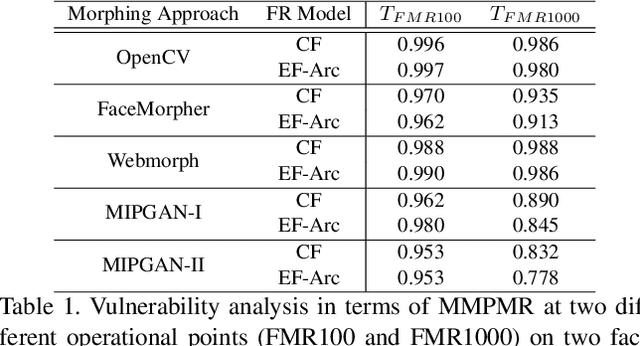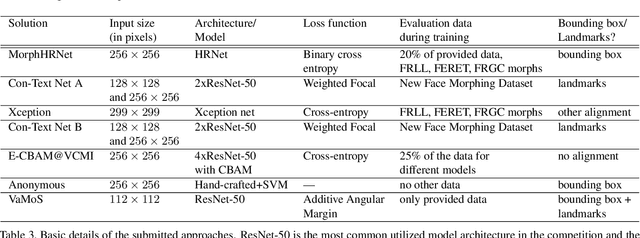Andrej Kronovšek
SYN-MAD 2022: Competition on Face Morphing Attack Detection Based on Privacy-aware Synthetic Training Data
Aug 15, 2022



Abstract:This paper presents a summary of the Competition on Face Morphing Attack Detection Based on Privacy-aware Synthetic Training Data (SYN-MAD) held at the 2022 International Joint Conference on Biometrics (IJCB 2022). The competition attracted a total of 12 participating teams, both from academia and industry and present in 11 different countries. In the end, seven valid submissions were submitted by the participating teams and evaluated by the organizers. The competition was held to present and attract solutions that deal with detecting face morphing attacks while protecting people's privacy for ethical and legal reasons. To ensure this, the training data was limited to synthetic data provided by the organizers. The submitted solutions presented innovations that led to outperforming the considered baseline in many experimental settings. The evaluation benchmark is now available at: https://github.com/marcohuber/SYN-MAD-2022.
Face Morphing Attack Detection Using Privacy-Aware Training Data
Jul 02, 2022



Abstract:Images of morphed faces pose a serious threat to face recognition--based security systems, as they can be used to illegally verify the identity of multiple people with a single morphed image. Modern detection algorithms learn to identify such morphing attacks using authentic images of real individuals. This approach raises various privacy concerns and limits the amount of publicly available training data. In this paper, we explore the efficacy of detection algorithms that are trained only on faces of non--existing people and their respective morphs. To this end, two dedicated algorithms are trained with synthetic data and then evaluated on three real-world datasets, i.e.: FRLL-Morphs, FERET-Morphs and FRGC-Morphs. Our results show that synthetic facial images can be successfully employed for the training process of the detection algorithms and generalize well to real-world scenarios.
 Add to Chrome
Add to Chrome Add to Firefox
Add to Firefox Add to Edge
Add to Edge